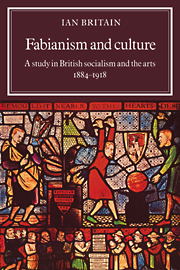Book contents
- Frontmatter
- Contents
- Preface
- List of abbreviations
- Introduction
- PART I THE LITERARY AND ARTISTIC ORIGINS OF FABIAN SOCIALISM
- PART II ART, AUSTERITY AND PLEASURE IN FABIAN SOCIALISM
- 5 The Webb partnership: the practice of renunciation
- 6 The Fabians as anti-ascetics
- 7 Powerhouse or club?: artistic activities of the Fabian Society
- 8 Platform or playhouse?: Fabian lecturing on the arts and the arts of Fabian lecturing
- PART III FABIANISM, ÉLITISM AND POPULAR CULTURE
- Conclusion
- Notes
- Bibliography
- Index
6 - The Fabians as anti-ascetics
Published online by Cambridge University Press: 29 September 2009
- Frontmatter
- Contents
- Preface
- List of abbreviations
- Introduction
- PART I THE LITERARY AND ARTISTIC ORIGINS OF FABIAN SOCIALISM
- PART II ART, AUSTERITY AND PLEASURE IN FABIAN SOCIALISM
- 5 The Webb partnership: the practice of renunciation
- 6 The Fabians as anti-ascetics
- 7 Powerhouse or club?: artistic activities of the Fabian Society
- 8 Platform or playhouse?: Fabian lecturing on the arts and the arts of Fabian lecturing
- PART III FABIANISM, ÉLITISM AND POPULAR CULTURE
- Conclusion
- Notes
- Bibliography
- Index
Summary
From a variety of motives, individual Fabians themselves have often voiced substantial criticisms of Fabian socialism. In attempting to redirect Fabianism along new paths as a way of dealing with the limitations of the old, some members of the Society have tended to overstate the extent of these limitations and to exaggerate the novelty of their own reforms. Overstatements of that kind may have a constructive intent and value in keeping the movement buoyant, but too much should not be read into them. If taken at face value as historical evidence, they can be damaging and distorting. Thus the criticisms of one of the most renowned of recent Fabians could very easily be used to corroborate the grim, ascetic image of the Society favoured by outside observers. Anthony Crosland has argued that an active concern with ‘human happiness’ can ‘at least claim the sanction of one powerful stream of socialist thought — that stemming from William Morris’; but he then says that ‘other, Non-conformist and Fabian, influences wear a bleaker and more forbidding air’. He associates this bleakness with ‘the Webb tradition’ in particular, and claims that ‘for one brought up as a Fabian’ the time has come for a ‘reaction’ against it, involving ‘a greater emphasis’ on such things as ‘culture, beauty, leisure’: ‘Total abstinence and a good filing system are not now the right signposts to the socialist Utopia.’
- Type
- Chapter
- Information
- Fabianism and CultureA Study in British Socialism and the Arts c1884–1918, pp. 143 - 162Publisher: Cambridge University PressPrint publication year: 1982

